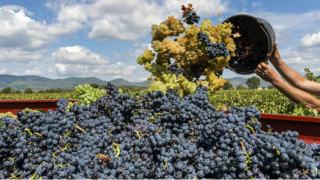Georgia has been subsidising grape prices since 2008 when Russia imposed a trade ban on Georgian wine. Since the Russian Federation was at that time the main export market for Georgian wine, the trade ban inflicted huge social and economic damage to the Georgian wine industry. In order to alleviate these damages, there was a need to subsidise grape prices in order to ensure less damage and keep grape farming profitable. In 2008-2012, the grape subsidy programme was miniscule. In particular, it cost GEL 0.15 for the Georgian budget to subsidise one kilogram of Rkatsiteli grapes, GEL 0.25 for one kilogram of Saperavi grapes and GEL 1 for one kilogram of Mujuretuli/Aleksandrouli grapes. In those years, GEL 6-7 million was allocated from the budget for the annual vintage.
The situation has changed since 2013 when a GEL 1 subsidy allocated for Mujuretuli/Aleksandrouli grapes remained the same but subsidies for Rkatsiteli and Saperavi grapes increased to GEL 0.4 and 0.35, respectively, with the arrival of the new government. Total budget allocations increased fivefold and reached GEL 32 million in 2013.
The subsidy structure was altered drastically in 2017, implying the government ceased subsidising grape prices, although allocated money to state-owned companies to purchase excess grapes on the market. State-owned companies, Harvest Management Company LLC and JSC Sakura, purchased grapes left unsold on the market and produced wine materials and spirits which would be sold on auction and at wholesale prices.
In 2008-2017, a total of GEL 165.8 million was allocated from the budget for grape price subsidies. In 2018-2019, the government did not subsidise grape prices, although allocated GEL 10 million to the state-owned Akura enterprise in both years which was, in fact, an indirect subsidy vis-à-vis the vintage.
In 2020, given the coronavirus pandemic, the Government of Georgia again decided to subsidise grape prices. GEL 40 million was allocated from the state budget to this end.
Graph 1: Budget Allocations for Vintage Subsidies in 2008-2021

Source: National Wine Agency of Georgia
Naturally, when budget allocations are increased massively, it is important to measure the efficiency of such subsidies and how fairly this money is spent. Since 2017, when the subsidy mechanism was altered, the government started to produce wine materials or spirits from the grape it purchased for sale on auction and at wholesale prices. To better illustrate this process, it is important to take a look at 18 May 2021 where 72 auctions were held to sell wine and spirits. Given the fact that the wines were sold not at wholesale prices but at a price which was cheaper than the unit cost, some questions were raised. For instance, the market price for Aleksandrouli/Mujuretuli grapes in 2019-2020 was GEL 7 whilst the government was selling one litre of wine produced from this grape for GEL 12.43 and Khvanchkara wine, produced from the same grape varieties albeit with a different technology, was sold for GEL 13.75. Given the fact that two kilograms of grapes are needed to produce one litre of wine, the auction prices are lower as compared to the unit cost.
Table 1: Wines Offered at the 18 May 2021 Auction

Source: Business Media
Of additional interest is that despite 72 auctions, only a small part of the wine was actually sold. Furthermore, prices were very low and the wines were divided into smaller parts which should have sparked greater interest, although this did not happen. In addition, there are many questions vis-à-vis the quality of the wine since it is unknown how the quality was evaluated and if the procedures for evaluation were in line with standards.
In sum, given the aforementioned facts, wine subsidies are inefficient. Despite vast sums of money spent over the years, the situation is deplorable in terms of efficiency if we take a look at the results of the 18 May 2021 auctions.
Author - Zurab Maisashvili
Category: Economy







